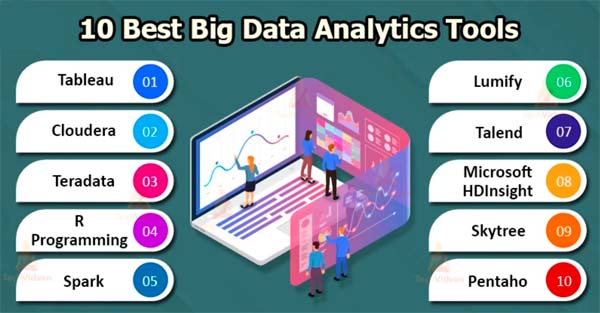Have you ever felt overwhelmed by the sheer volume of data you’re dealing with? Don’t worry; you’re not alone. As the world becomes more digitized, businesses are generating and processing vast amounts of information. This is where big data analytics tools come into play.

The Importance of Big Data Analytics
Big data analytics is essential for organizations to make better, data-driven decisions. By analyzing vast amounts of structured and unstructured data, businesses can uncover hidden patterns, trends, and insights that would otherwise go unnoticed. This helps them to better understand their customers, optimize operations, and drive growth.
So, let’s dive into the world of big data analytics tools and explore some of the top options available today.
Top Big Data Analytics Tools
Apache Hadoop
Hadoop is an open-source framework that enables distributed storage and processing of large data sets. With its highly scalable and fault-tolerant architecture, Hadoop has become a go-to solution for many organizations looking to handle big data. Its ecosystem consists of various components, including HDFS for storage and MapReduce for processing data.
Apache Spark
Spark is another open-source big data processing framework that has gained popularity due to its speed and ease of use. Unlike Hadoop’s MapReduce, Spark can process data in-memory, making it much faster. It supports various languages like Java, Scala, Python, and R, making it a versatile choice for developers.
Tableau
Tableau is a popular data visualization tool that allows users to create interactive and shareable dashboards. With a user-friendly drag-and-drop interface, Tableau makes it easy for non-technical users to analyze and visualize data, helping businesses to make more informed decisions.
Microsoft Power BI
Power BI is a business intelligence and analytics tool developed by Microsoft. It allows users to create interactive visualizations, reports, and dashboards, integrating with various data sources. With a wide range of features and customization options, Power BI is a powerful tool for organizations of all sizes.
Google Analytics
Google Analytics is a widely used web analytics service that tracks and reports website traffic. It helps businesses to understand their online audience and optimize their digital presence. With its comprehensive reporting features and easy integration with other Google services, Google Analytics is an indispensable tool for digital marketers.
QlikView
QlikView is a business intelligence and data visualization tool that allows users to create guided analytics applications. With its unique associative data model, QlikView enables users to explore data and uncover hidden insights without being limited by predefined hierarchies or query structures.
Splunk
Splunk is a data platform designed for real-time monitoring, searching, and analyzing machine-generated data. With its powerful indexing and searching capabilities, Splunk is ideal for organizations looking to gain insights from log data, security events, or other machine-generated data sources.
Talend
Talend is a data integration and management platform that simplifies the process of collecting, transforming, and cleaning data. With a wide range of connectors and built-in data quality features, Talend makes it easy to integrate data from various sources and prepare it for analysis.
Alteryx
Alteryx is a self-service data analytics platform that enables users to blend, prepare, and analyze data with ease. Its intuitive interface and drag-and-drop functionality make it accessible to users with varying levels of technical expertise. Alteryx also offers advanced predictive and spatial analytics features for more in-depth analysis.
Domo
Domo is a cloud-based business intelligence platform that offers data integration, visualization, and collaboration features. With its real-time data processing capabilities and easy-to-use interface, Domo empowers users to make data-driven decisions quickly and efficiently.
Factors to Consider When Choosing a Tool
When selecting a big data analytics tool, it’s crucial to consider factors such as:
- Scalability: Can the tool handle your current data volume and grow with your organization’s needs?
- Speed: How quickly can the tool process and analyze data?
- Ease of use: Is the tool user-friendly and accessible to both technical and non-technical users?
- Integration: Can the tool easily connect with your existing data sources and infrastructure?
- Customization: Does the tool offer flexibility and customization options to meet your unique requirements?
- Cost: What is the total cost of ownership, including licensing, maintenance, and support fees?
Conclusion
In summary, big data analytics tools play a vital role in helping organizations unlock the value of their data. By choosing the right tool, businesses can gain valuable insights, optimize operations, and drive growth. Remember to consider factors like scalability, speed, ease of use, integration, customization, and cost when making your decision.
Read More:
- Big Data Provider: Revolutionizing the Way Businesses Operate
- Big Data Technologies of Data Analysis And Business Intelligence
- What Is An Example Of Big Data? Explained With Real-Life
- Big Data Architecture: Designing for Scale, Speed, and Flexibility
- Business Intelligence vs Big Data (Differences And Similarities)